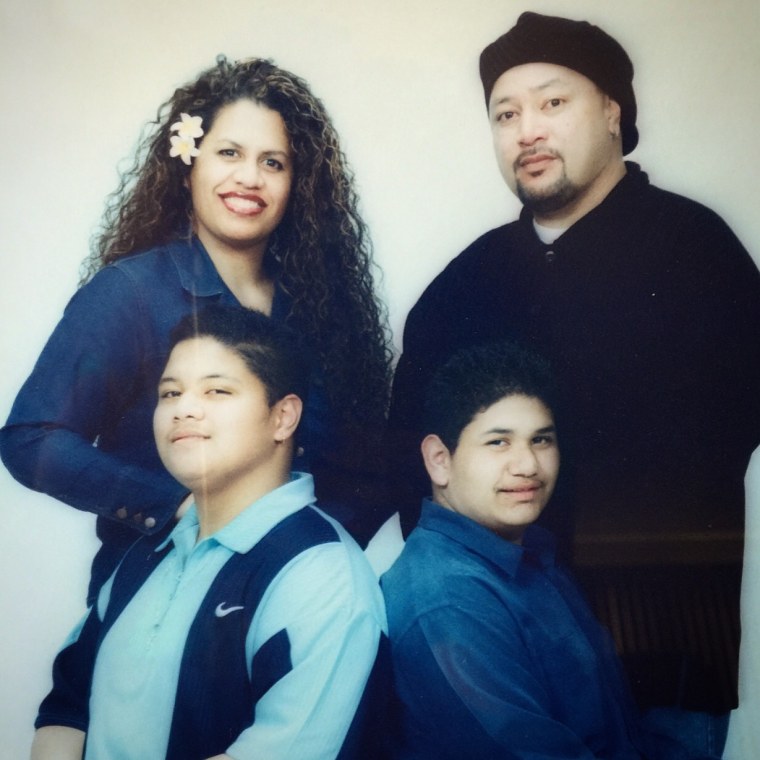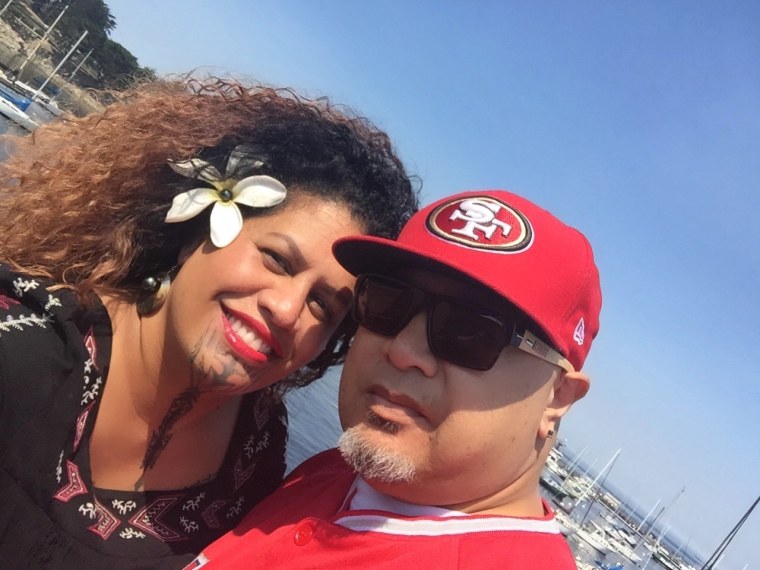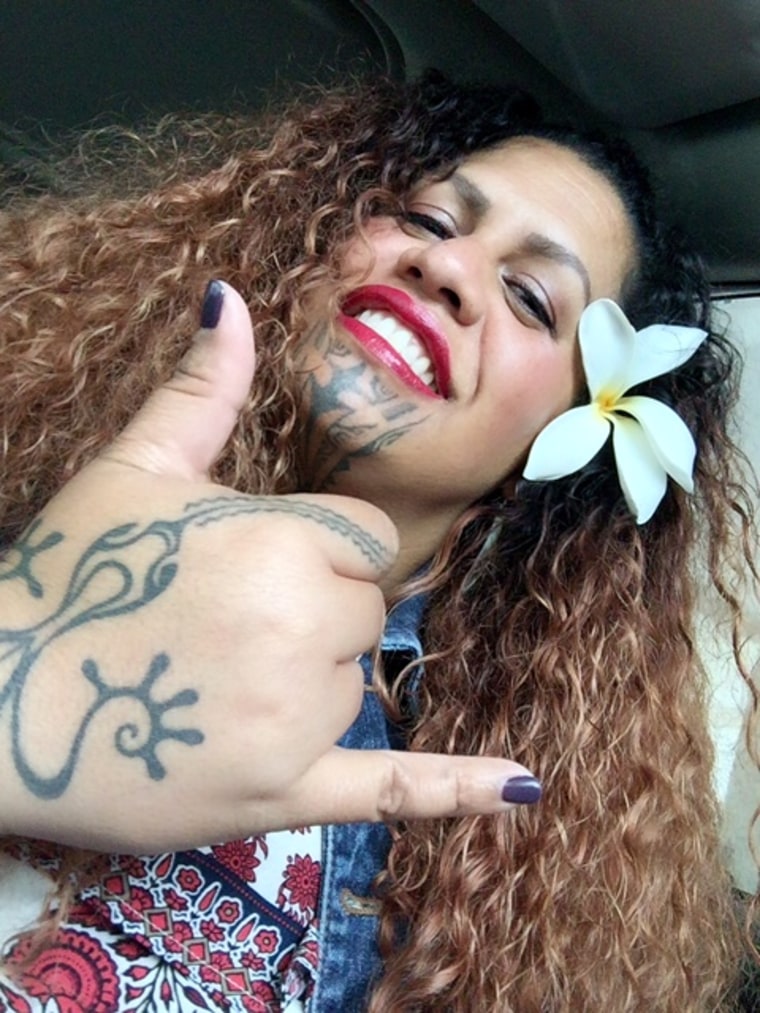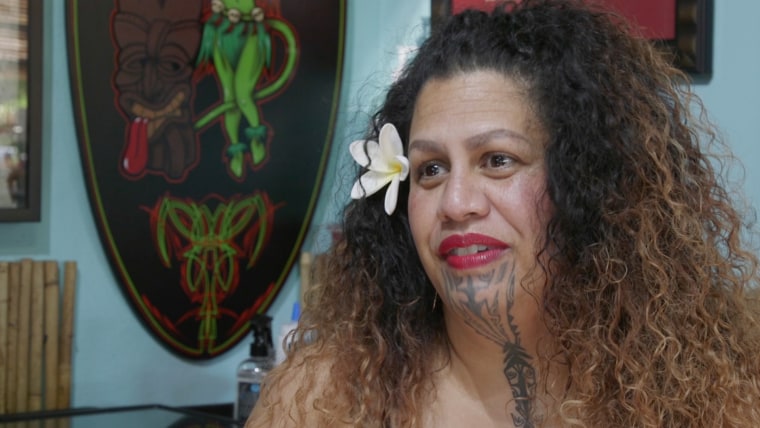When tattoo artist Marlo Lualemana made the decision to share her story as a survivor of childhood sexual assault, the response she received from friends, clients, and followers from social media was overwhelming.
“I can’t begin to tell you how many people private messaged me and told me, ‘thank you so much. I’m not quite ready to open myself up yet, but thank you for doing that,” Lualemana told NBC News. “It let others know they are not alone, and it created a lasting bond with those I’ve come in contact with both through tattooing them or just talking in person.”
Lualemana was sexually assaulted at the ages of five and nine while growing up in Hawaii, she said. For many years, she didn’t tell her family or friends about the assaults and hesitated to put her story on social media. But since coming forward, many of her clients and social media followers have been inspired to also share their stories and experiences of trauma and healing.
“I never shared this story to my family. It wasn’t until I put it on Instagram and Facebook last month,” the 47-year-old mother of two said.
“I stay humble, I let my work speak for itself and sometimes these guys don’t know I’m a female until they look more into my work and they’re intrigued."
Today, she uses her craft as a tattoo artist to educate others about Native Hawaiian cultural identity and empower sexual assault survivors through the art of tattooing. Lualemana believes that sharing her own story has helped some of her clients, many of whom are sexual assault survivors, open up.
She referenced a recent time when a client of hers decided to open up to Lualemana about the trauma he experienced after being molested as a child after he saw that Lualemana went public with her own story.
“[Sexual assault] affects men and women. If I can help in some way — at least help them to find a path with tattooing that allows them to find a message, to breathe again, and open up and understand they’re not alone and it’s okay to talk about it — I’ve done my part,” she said.
As the co-owner of Earthbound Tattoo Studio in Sand City, California, Lualemana is known for creating customized neo-Polynesian, tribal, and lettering patterns that represent symbols of strength and protection.

For Lualemana, it’s both an honor and responsibility to ink her clients and make them feel as comfortable as possible and proud of the art on their skin.
“It’s hard to describe it, but people tend to open up and when they do I feel like we have a connection, a lifetime connection and they feel the same way,” she said. “They feel their tattoo represents a new beginning, a new chapter, and it’s going to help them heal when they look at it.”
“If I’m able to help in some little way, somebody, when they look at the tattoo and relate...and relate to the fact that it represents a survivor, then I feel like I’ve done something positive,” she added.

A tattoo artist and professional dancer for the past 11 years, Lualemana started off sketching tattoo pieces, watching YouTube tattoo videos, and spending hours studying and learning about the significance of certain motifs and patterns. She credits her husband as a huge influence who nurtured and inspired her to give tattooing a try. He was also the first person she practiced on.
“He said, ‘hey baby, you should start tattooing. He was my first tattoo, and he looked at it like a rite of passage,” she said.
Before she went on to ink human skin, Lualemana practiced inking on honeydew melons and other fruit that had a “fleshy texture” after her husband brought home a tattooing starter kit and coil machine. After a few days, she was hooked and knew it was her calling.
“I tattooed the shit out of these fruit, there wasn’t a spot left on these things and saved them for three months and my husband said, ‘baby, we got to let them go,’” she said.
Lualemana counts as many as 10 tattoos on her body. The one she feels most connected to is the one that was inspired by her grandmother: A female lizard motif on her chin, which connects to other parts of her body.
“A lot of my tattoos are referenced to that ʻAumākua,” said Lualemana, using a Hawaiian word that translates to “ancestral guardian spirits.”
“I was really close to her [grandmother], and I wanted to show some respect and honor. The best way I could do that is through tattoos because it’s permanent, and I feel like she’s watching over me.”

The tattoo on Lualemana’s face has received mixed attention, she noted. Before going through with the face tattoo, she thought about it for three years.
“Especially for women, it’s a whole beauty image. You got your magazines, and there’s this stigma that we have to be a certain way, so to tattoo your face is not the norm,” she said. “For the most part, people are really intrigued and then 25 percent give me that look, ‘like why did she do that? She must not work, she must be an idiot, why would she tattoo her face?”
But Lualemana says these comments do not stop her hustle or bring her down because each tattoo has a unique story to tell.
In honor of her husband’s family, she recently got a tattoo that took over six hours to complete. “It goes from below my kneecap to my high thigh, wrapped on both legs. That was something I won’t forget and the honor to my husband’s family,” said Lualemana, adding that she doesn’t just put “anything on her body” unless it signifies something deeper that represents the stories of her ancestors and the stories of her lineage.
Before she became a full-time tattoo artist, Lualemana grew up in Waimānalo, Hawaii, and spent her early childhood performing hula. She was born to dance, as her dad was a Hawaiian entertainer for as long as she can remember.

“We have a love and passion for our culture and I’m grateful to my parents because they instilled Hawaiian values in us and we were raised to respect our elders,” Lualemana said. “My sister danced, my mom danced.”
As she grew older, Lualemana joined Nā Lei Hulu I Ka Wēkiu, a professional Hawaiian dance troupe in San Francisco for 10 years. She would make frequent touring trips from Monterey to San Francisco on the weekends while practicing traditional and contemporary hula . During that same time, she simultaneously worked as a tattoo artist, though she recently retired from hula dancing due to knee problems, she explained.
“I tattooed full-time and danced hula on the weekends, so I had no day off. Because I had such a love for tattooing and because I realized that I was starting to get really good at it, I knew that I have to continue to learn,” she said.
“[Sexual assault] affects men and women. If I can help in some way ... with tattooing that allows them to find a message, to breathe again, and open up and understand they’re not alone and it’s okay to talk about it — I’ve done my part.”
Every day, Lualemana puts as much “energy and aloha” into her customized tattoo pieces as she can, capturing different stories that relay messages of peace, resilience, and strength. She’s had cancer survivors, people who have battled depression and suicide, and clients who have come to get a tattoo for the first time, wary and unsure of what to expect, she said.
Lualemana spends a majority of her time at work conversing with her clients and learning more about what they hope to get that will best encompass their unique story. She freehands and draws on them for an hour before the actual tattooing process starts. They come in as clients, but leave as family, she said.
“With tattooing, I’m able to educate people, and I’m grateful for that. I tell people a little bit about my culture and how proud I am to be Hawaiian and give them a little history about Polynesian history. I tattoo a lot of people and hope I leave an impression on them so they have a greater respect for my culture and the Polynesian people as a whole,” she said.
She’s had clients travel from Oregon, Texas, London, Dubai, Brazil, and Italy, to get inked at Earthbound Tattoo Studio. Many who come to get a tattoo are surprised to find they’re being tattooed by a female Hawaiian tattoo artist, she said.
“I stay humble, I let my work speak for itself and sometimes these guys don’t know I’m a female until they look more into my work and they’re intrigued. A lot of men are just like enamored by the fact they are being tattooed by a Hawaiian tattoo artist, because there are only a few left,” Lualemana said, adding that she takes a lot of pride being one of the only “recognizable Hawaiian female tattoo artists in California.”
“People want to stop and look [at my tattoos] and I get possible clients and people are curious,” she said. “They want to know what they represent. For me, they represent my passion, my love, and respect for my culture.”
Follow NBC Asian America on Facebook, Twitter, Instagram and Tumblr.
